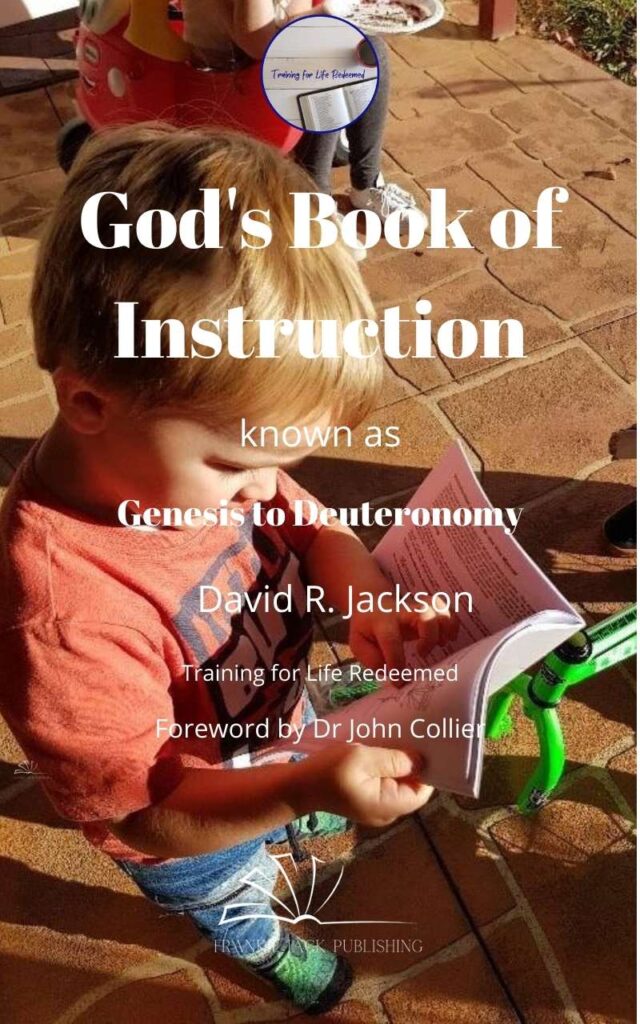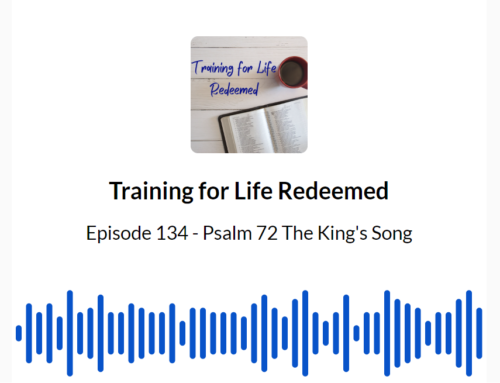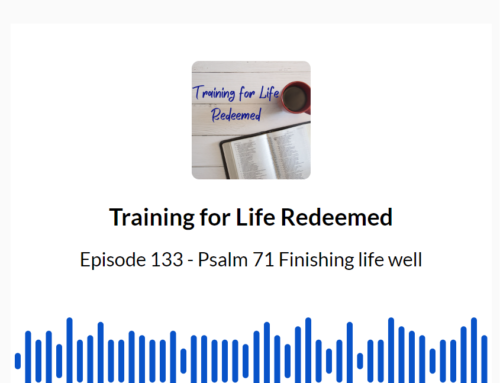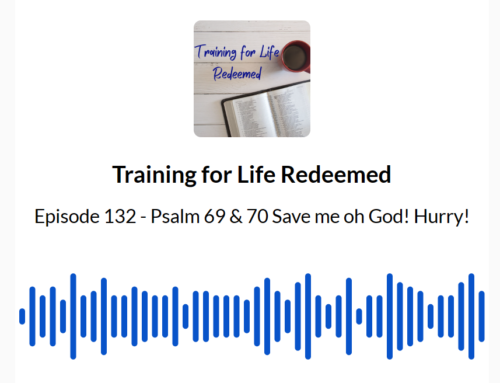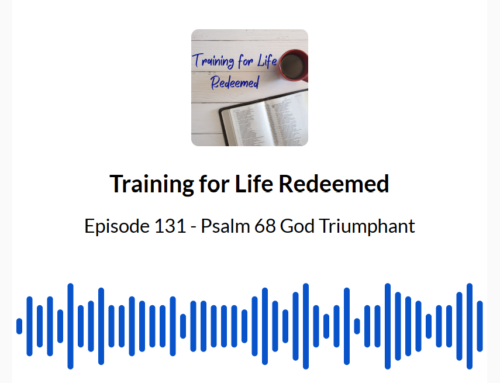Grab your notes for this episode by completing the form
and we will send you the link to all our notes.
Get the book “God’s Book of Instruction” on Amazon.
The first five books of the Old Testament constitute God’s book of instructions for his redeemed people. It reveals the character of God and his good design for life. It bears witness to the beginning of his work of redemption. It equips the believer to live in God’s world, God’s way, as God’s image for God’s glory. What sin and death have broken, God’s people can rebuild by keeping to his instructions by the power of his presence with us.
Transcript
Dan:
Hi, everyone. And welcome again to training for life redeemed. Today, we’re up to episode 14 and we’re looking at Exodus 21 to Numbers, 36, all about maintaining holiness. I’m Dan , your host, and I’m here with my dad, David Jackson. Today we’re gonna be looking at Exodus, Leviticus, and Numbers. In fact, we are looking at this over the next few weeks as we go and look at the kind of themes that go through this and different areas of Israel’s life that had to be put back together. In this episode, we are looking at their need to deal with sin and physical uncleanness. This wouldn’t have been an easy challenge, especially when you have thousands of people camping together in the bush. So Dad, why can’t we just skip it? We don’t do this under the new covenant.
David:
This is the whole section of about holiness, separation from sin and filth. And in the New Covenant, we tend to look at it and say, well, Jesus died on the cross. He paid for my sin. It’s all finished. I’m done. That’s all I need to know. And we lump all of this stuff in and we just sort of look at the outside surface of our salvation. When you go back into the, into the Torah, into the God’s instruction book for us, he gives us the blueprints for how complex all of this is and all the detail that God’s taken care of when he took away our sin. And so it’s a little bit like a friend of mine who came back and he did a tour of Europe and he took all these wonderful photographs of all these buildings and cathedrals and everything else. And we’re just a bunch of young blokes looking at all these pictures and going, yeah, yeah , yeah , isn’t this amazing. And my father sitting there, he’s a tradesman and he looks at photographs of Notre Dame and these great cathedrals and things. And his first question was who washes the windows and we all broke up laughing, but then he started to challenge us to think. Somebody had to put that window in. Somebody had to design all the bits of stone that made the window frame. This thing is a hundred feet in the air. This is all done without power tools. And as you start to appreciate the design and everything else, all of a sudden what just looked like a pretty picture is an amazing story. And it’s all complex and you start to appreciate what’s going on. So when we open up this holiness code back in the in the Torah, we’re going to unpack sin makes life messy and damaged and broken there’s bits everywhere and all kinds of rottenness. And when Jesus died on that cross, he paid for all of it, but we need to go back and find out just what did that change? And that’s what all this, the sacrificial system, the tabernacle, all of these rituals, that’s what they explained to us.
Dan:
Okay . All right . So most people know that Jesus died in our place. Like, you know , the animals that died in the sacrificial system. As we read Leviticus, it looks like they were actually killing animals, kind of over and over and over again for pretty much any reason at all, some of which, you know , completely, not even in our control, you know, you need sacrifices for stuff that’s just common day activities that happen to people that you don’t get to have a say over a why are there so many different kinds of sacrifices and offerings?
David:
Well, if you wonder, when we look , talk about forgiveness, we tend to think, you know, Freddie Nurk offended me. I’m just going to be a Christian and go over there and say, I forgive you. That indicates that we don’t really, when Jesus said, forgive your enemies, forgive those who are offending you. He was talking off the back of the whole old Testament. He was saying, you need to get to the end of that whole process. We tend to look at it, and go, Yeah. You say, sorry, I say, I forgive you. And that’s the end of the matter. That doesn’t work. When you have somebody come up to you who, when the rapist arrives to the victim of rape, the person that he raped and he says, I’m sorry, their response isn’t I forgive you. There’s a whole lot of other stuff has got to happen for that relationship to be remotely restored. What we have in the, in the sacrificial system is that we take care of every little bit of the damage bit by bit. So you’re going to offer a sacrifice for your guilt. You’re going to offer a sacrifice for the damage that it did. you going to offer a sacrifice when you pay , when you restore the damage? So you smashed my car, you buy me a new car. Then we offer the reparation sacrifice. When we’ve done all of that, that guilt , all the damage, all the restoration of the damage. Then we can sit down and have our fellowship offering and sit at table with God and be God’s family again. And everything’s forgiven, but you got to go through that process. And if you don’t appreciate that process, then what Jesus did on the cross is wafer thin. He has paid for the whole package and we need to work that through with one another. And the Old Testament, this sacrificial system will teach us how to put things right from the beginning to the end and clean up the mess.
Dan:
All right. So we can’t just repent and say, sorry, and let it go. I get that. But you also are not making all these sacrifices anymore. So how does it then apply? Now.
David:
Yeah. Well, if we’re going to be doing repentance and seeking, we’re doing it because Jesus has already paid for it. Now that that immediately solves the problem, the problem at one level, it takes care of our guilt. We then have to turn around and take action to live out what it means to be right with the person we’ve offended. And that involves, you know, I’ve damaged your car. I’ve got to go and pay for that. I’ve hurt you in some way, without repentance. Those words are meaningless. So we’re looking for change. We’re looking for not only changing behavior and attitude, but changing the way we relate to each other. And this sacrificial system just works you through. You can imagine the two people going up to the tabernacle, bringing the offended party is bringing the sheep and the goats and everything else. And you’re looking at the cost of sin. And you’re looking at everybody else, standing around a witnessing, how you’re putting it right. And putting it back together. And at the end of the day, the animals are gone because Jesus paid for it all. But the two people still have to go through this process of working it through. And these instructions help us to do that. It’s one thing to say, sorry, but it’s another thing to be able to build, rebuild that relationship. And that’s what the Torah teaches us to do. And if we know how much damage we’ve done, then we know what things we have to address.
Dan:
All right , well, sin is one thing, but why is God offended when we just get sick? Or if I break my finger or, you know , if I’m getting injured, why if God offended at that, that , that isn’t the case anymore? Surely
David:
This is good fun . We need to go back and remember that sin is also physical. So the damage when Eve ate that fruit and gave it to her husband and he ate it. They introduced rottenness evil into their bodies. And the instant reaction was to run and hide. Suddenly what was beautiful is pouring out stuff. That’s disgusting. In that process, we look at our bodies and we say, I’m dying. I’m falling apart. When Jesus died on the cross, he paid for my sin. And the result of that is he will rise. He Rose again. And if I put my faith in him so will I. My body will get fixed. And you wa tched J esus wa lk t hrough the Jewish community at the time and the gentile community, which was more astounding. And he picks his target. He picks the most damaged. He picks the people who are on the outer. He picks people with leprosy and he deliberately does things that are shocking. He spits on a man’s tongue. he sticks his finger in some other fellow’s ear. And you get the impression that sin is, the damage of sin is infectious. We’re in the middle of a pandemic. You breathe the air, you touch somebody, you catch the disease. The disease is dominant. Good health is not, it’s more like the victim, but with Jesus holiness, health, wholeness is dominant. And if you touch Jesus, you catch good health. He’s reversing all the damages of sin. The sacrificial system teaches us to understand that what’s normal for us is actually disgusting. We stink, we are unclean , everything that comes out of us is gross, and Jesus is going to change that he’s going to heal what we accept as normal and turn it into what it was originally designed to be, which is beautiful. We need to learn that. And we learn that by watching and understanding the complexity of the damage sin has done, and the wonder of what Jesus does then to reverse it.
Dan:
Well, that brings us to the end of our episode. And I hope that you’ve enjoyed exploring why it’s really important to actually go through and read up about the sacrificial system and all the processes that were put in place for Israel to show them and to teach them that sin is serious, that it requires some kind of punishment because forgiveness is a really challenging experience, especially when the people who do the wrong thing, refuse to repent. You might want to check out a really helpful little book by Chris Brauns, called “Unpacking Forgiveness. You can get the details from the PDF notes or the study notes for this episode. So if you’ve enjoyed today, please make sure that you click the button to subscribe. I want to thank you very much for listening, and if you want the study notes for this episode, please make sure you head over to training for life redeem.com/fourteen and grab those there.
